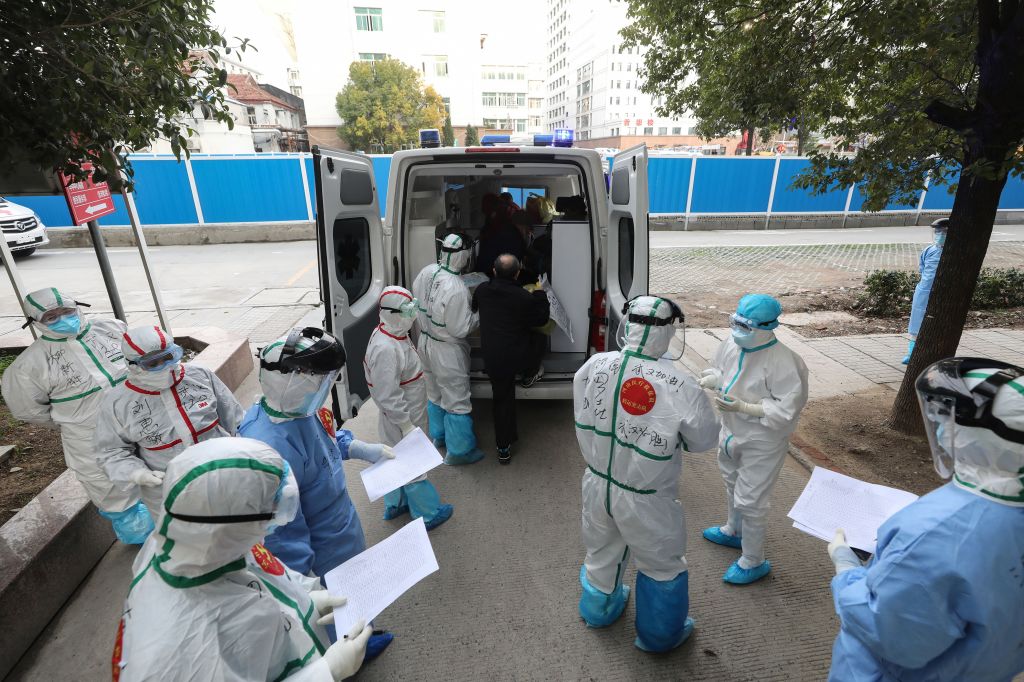Study allays fears that blood pressure drugs worsen COVID-19 for patients with hypertension


A free daily email with the biggest news stories of the day – and the best features from TheWeek.com
You are now subscribed
Your newsletter sign-up was successful
COVID-19 patients with hypertension are already at a higher risk of death, so it was worrisome when researchers pondered whether taking blood pressure drugs could exacerbate the illness. The medical community was relieved, however, when a study published last week in the European Heart Journal found that taking drugs that control hypertension actually reduced mortality, CNBC reports.
Among nearly 2,900 people hospitalized in February and March at Huo Shen Shan hospital in Wuhan, China, patients with hypertension had twice the risk of death and were more likely to need ventilation than those without, but among the patients who did have high pressure, those treating it with medication significantly lowered their fatality risk.
The findings were surprising — one of the authors, Fei Li of Xijing Hospital in Xi'an, China, was expecting the opposite results — but hopeful, even though normal caveats apply (evidence is from observation rather than randomized trials). "We suggest that patients should not discontinue or change their usual antihypertensive treatment unless instructed by a physician," Li said.
The Week
Escape your echo chamber. Get the facts behind the news, plus analysis from multiple perspectives.

Sign up for The Week's Free Newsletters
From our morning news briefing to a weekly Good News Newsletter, get the best of The Week delivered directly to your inbox.
From our morning news briefing to a weekly Good News Newsletter, get the best of The Week delivered directly to your inbox.
As things stand, the study relates to COVID-19 patients with high blood pressure, which is still crucial considering how many people in the United States suffer from hypertension. Not only do the drugs give those patients a much higher chance of surviving the coronavirus, but it also means they won't have to stop taking their medication, which adds another layer of general risk.
But there's also talk that these drugs could be studied as an actual treatment for COVID-19, Dr. Luis Ruilope of the Hospital Universitario 12 de Octubre in Madrid wrote in an editorial in the journal, which makes sense since there's growing evidence COVID-19 may be a vascular disease, rather than a purely respiratory one.
A free daily email with the biggest news stories of the day – and the best features from TheWeek.com
Tim is a staff writer at The Week and has contributed to Bedford and Bowery and The New York Transatlantic. He is a graduate of Occidental College and NYU's journalism school. Tim enjoys writing about baseball, Europe, and extinct megafauna. He lives in New York City.
-
 Why are election experts taking Trump’s midterm threats seriously?
Why are election experts taking Trump’s midterm threats seriously?IN THE SPOTLIGHT As the president muses about polling place deployments and a centralized electoral system aimed at one-party control, lawmakers are taking this administration at its word
-
 ‘Restaurateurs have become millionaires’
‘Restaurateurs have become millionaires’Instant Opinion Opinion, comment and editorials of the day
-
 Earth is rapidly approaching a ‘hothouse’ trajectory of warming
Earth is rapidly approaching a ‘hothouse’ trajectory of warmingThe explainer It may become impossible to fix
-
 Trump HHS slashes advised child vaccinations
Trump HHS slashes advised child vaccinationsSpeed Read In a widely condemned move, the CDC will now recommend that children get vaccinated against 11 communicable diseases, not 17
-
 FDA OKs generic abortion pill, riling the right
FDA OKs generic abortion pill, riling the rightSpeed Read The drug in question is a generic version of mifepristone, used to carry out two-thirds of US abortions
-
 RFK Jr. vaccine panel advises restricting MMRV shot
RFK Jr. vaccine panel advises restricting MMRV shotSpeed Read The committee voted to restrict access to a childhood vaccine against chickenpox
-
 Texas declares end to measles outbreak
Texas declares end to measles outbreakSpeed Read The vaccine-preventable disease is still spreading in neighboring states, Mexico and Canada
-
 RFK Jr. shuts down mRNA vaccine funding at agency
RFK Jr. shuts down mRNA vaccine funding at agencySpeed Read The decision canceled or modified 22 projects, primarily for work on vaccines and therapeutics for respiratory viruses
-
 Measles cases surge to 33-year high
Measles cases surge to 33-year highSpeed Read The infection was declared eliminated from the US in 2000 but has seen a resurgence amid vaccine hesitancy
-
 Kennedy's vaccine panel signals skepticism, change
Kennedy's vaccine panel signals skepticism, changeSpeed Read RFK Jr.'s new vaccine advisory board intends to make changes to the decades-old US immunization system
-
 Kennedy ousts entire CDC vaccine advisory panel
Kennedy ousts entire CDC vaccine advisory panelspeed read Health Secretary RFK Jr. is a longtime anti-vaccine activist who has criticized the panel of experts
